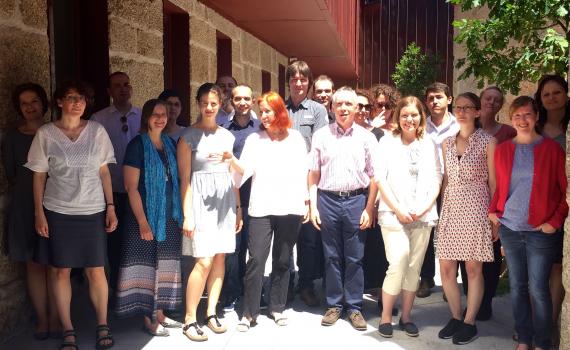
BACKGROUND
European Union (EU) member states and the European Commission (EC) have taken a number of steps to ensure that research and innovation are more aligned with social needs.
Among these was the initiation of the FOSTER (Facilitate Open Science Training for European Research) project. The FOSTER project encouraged the use of open science, a research model that makes research more visible and accessible, exposing results to wider analysis and allowing researchers to re-use results for new discoveries.
There were two phases of the FOSTER project. EIFL’s involvement, in leading, coordinating and contributing to training, spanned both phases.
The first phase started in February 2014 and ended in August 2016. The project supported research stakeholders in Europe, especially young researchers, to adopt open access (OA) and to comply with OA policies and rules for implementation of the EU’s flagship 80-billion Euro funding programme for research and innovation, Horizon 2020 (H2020).
The second phase started in May 2017 and ended in April 2019. The project contributed to a real and lasting shift in the behaviour of European researchers by supporting open access, open data and open science practices of early career researchers. The aim was to ensure that open science became the norm in research.
OVERVIEW OF THE FOSTER PROJECT
The FOSTER project’s main activities centred on integrating OA, open data and open science principles and practices into research workflows by providing training for early career researchers.
EIFL contributed to the FOSTER project by -
- Leading and coordinating training
- Facilitating development of e-learning courses
- Developing training materials
TIMELINE
February 2014 - April 2019.
ACHIEVEMENTS
The FOSTER project -
- Trained over 14,000 people - mostly early career researchers - in more than 400 training events in 41 countries.
- Developed a portal with information about open science and a wide range of e-learning and training resources for early-career researchers, data managers, librarians, research administrators and others.
- Created an online learning programme for early career researchers:
- The FOSTER Open Science Toolkit comprises of 12 self-learning courses in English and Spanish, organized into five learning paths or specializations: The open access author, The responsible data sharer, The reproducible research practitioner, The open innovation accelerator and The open peer reviewer. Learners who complete a course or specialization are rewarded with an ‘open badge’ that recognizes their knowledge and skills.
- Developed four moderated e-learning courses: Open Science basics, Research Data Management (in Portuguese), Open Access to Publications in Horizon 2020, and How to re-use the FOSTER Open Science Toolkit.
- Co-created the Open Science Training Handbook. This e-resource provides guidance and resources for open science instructors and trainers, including examples of training courses, course outlines and training methods. The Handbook, created by 14 authors, is an open, living resource that trainers can add to and adapt. It is available via the portal in English, Portuguese and Spanish.
- Built capacity of 250 open science trainers from across Europe in 10 train-the-trainer bootcamps.
- Stimulated over a dozen European universities to introduce accredited courses on open access, open data and open science for their students. Among the universities are two institutions from EIFL partner countries, Tartu University in Estonia and Kaunas Technical University in Lithuania.
- Developed an open science taxonomy, defining and structuring open science. The Open Science Taxonomy Tree (a diagrammatic representation of open science and its various components) was used to structure the FOSTER e-learning portal, and has been accepted by the research community.
PROJECT PUBLICATIONS
All project publications are available here.
GET INVOLVED
Join the FOSTER community of trainers and view and download materials from the Open Science trainers' corner.





